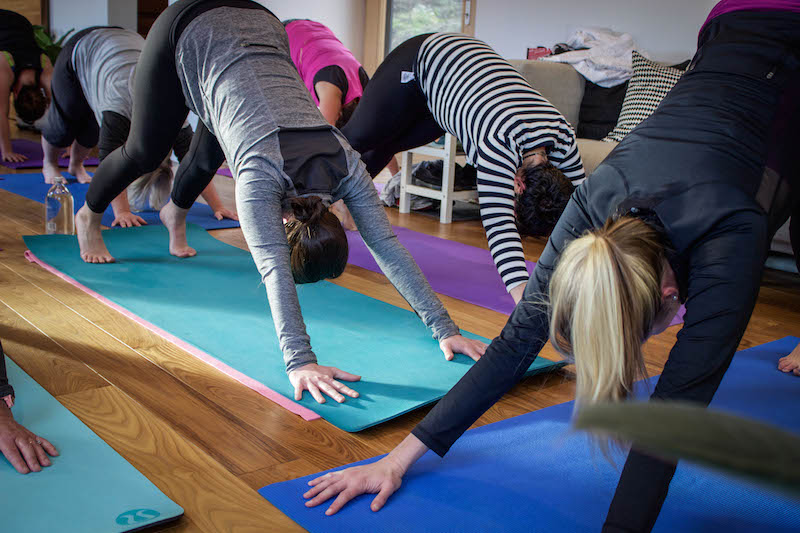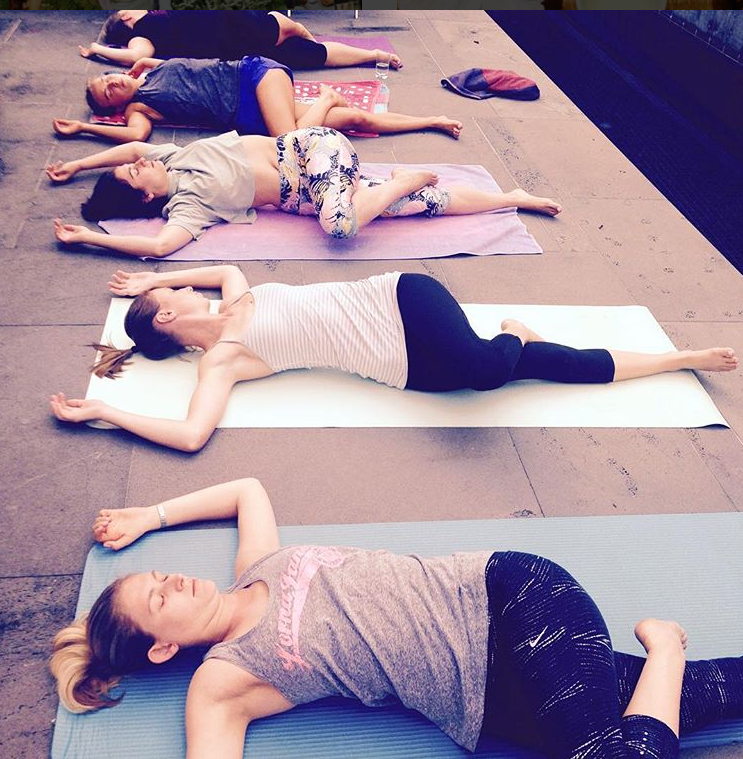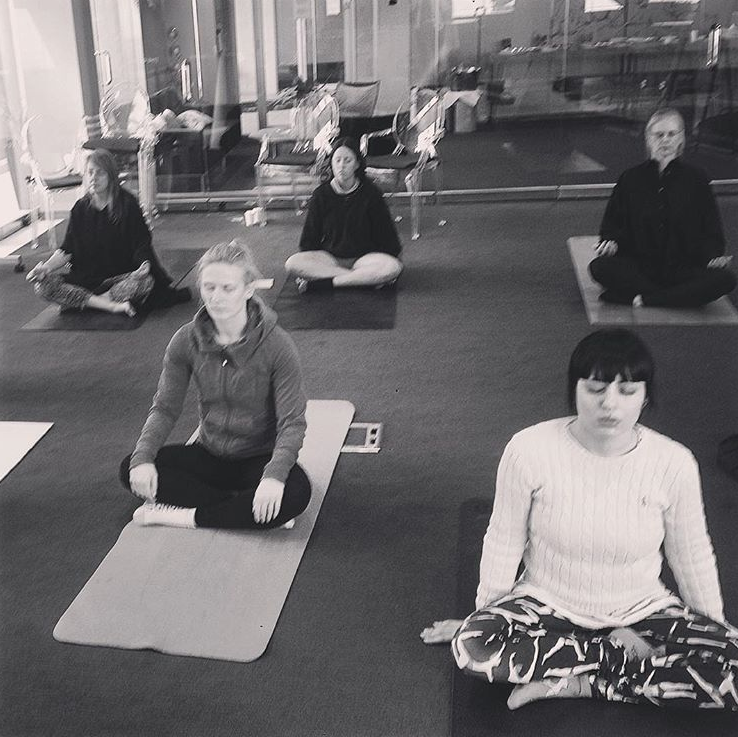
Aprivé Wellness Blog
How to Eat Healthy In Winter - 3 Easy Recipes
Simple Recipes to Supercharge Your Winter Wellness
At my retreats and workshops this winter, so many people have told me they struggle to eat healthy in winter when fruit and veggies are hard to find.
So! Here are my top 3 recipes full of super healthy foods you can make with the best seasonal veggies winter has to offer!
1. Vegan, Gluten-Free Pumpkin Soup
You don’t need heavy cream to create a great pumpkin soup! This one is super easy and jam-packed full of rich vitamins to supercharge your winter wellness.
Cooking Time: 1.5 hours (but mostly simmering. You can work on your Aprivé Wellness workbook while it's cooking!)
You’ll Need:
1/2 Pumpkin
1 tbsp. Gluten-free, vegetarian stock (Vegeta is my fave)
2 Sweet Potatoes
1 Leek
2 Potatoes
6 Cloves of garlic
1 Brown onion
1 jar of chilli flakes
Salt & pepper
1 cup of raw lentils
Method:
1. Fill your kettle and boil the water. Once ready, pour the boiling water into a saucepan and add the lentils. Boil for 20 minutes or until soft. Wash and drain in a colander (no you don’t have to soak them overnight!)
2. Dice garlic, onion and leek into small pieces. Only use the leek up until the green leafy part.
3. Add a big soup pot to your stove and turn up the heat. Once it’s hot, add 2 tbsp. olive oil and the garlic, onion and leek. Add salt, pepper and a sprinkle of chilli and stir rapidly.
4. Once the mixture has browned, turn it off and set it aside while you peel and cut the other veggies into small squares.
5. Once your pumpkin, sweet potato and potato are cut, add them to the onion mixture and stir on a high heat.
6. Add a litre of boiling water and around a tbsp. of stock.
7. Bring the mixture to the boil and let it bubble away for around 5 mins.
8. Turn it down to simmer, and let it simmer slowly for around 1 hour (you can work on your wellness goals while it’s cooking!)
9. Once the mixture is mushy and soft, squash it with a wooden spoon to make it lumpy and thick. If you prefer a smooth soup, take your hand blender to it!
10. Add lentils and garnish with a little curl of leek and it’s ready!
2. Pumpkin Salad with Feta - Your Healthiest Lunch Yet!
Cooking Time: 30 mins
Tip: Get up 30 minutes earlier on Monday morning and cut up pumpkin (leave skin on) and sweet potato with garlic (skin on). Cover in 2 tbsp. olive oil and add salt and pepper. Bake until soft. Then keep the mix in the fridge, ready for your lunches for the week!
You’ll Need:
Half a pumpkin and 2 sweet potatoes pre-roasted with garlic & salt and pepper
2 handfuls of baby spinach
1 tomato
3 slices of feta
1 grated carrot
1 tbsp. balsamic vinegar
1 squirt of mayonnaise or a creamy vinaigrette
Method:
1. Get all the ingredients
2. Throw them into a big tupperware container
3. Put it in the fridge at work
4. When you’re ready to eat it, give it a good shake till the feta, balsamic and mayo all mix
5. Eat!
3. Silverbeet & Ricotta Side Dish - The Super Food Winter Side Dish
If you’re a fan of meat and three veg, you can sick of the standard steamed broccoli side. Try this silverbeet dish. Silverbeet is full of iron and tons of goodies only found in dark green leafy veggies, and it’s best in winter! Perfect!
Cooking Time: 5 mins
You’ll need:
1 pack of Silverbeet (around 12 stalks)
3 cloves garlic
1/2 tub Ricotta cheese
6 Mushrooms
Hot sauce
Sweet Chilli sauce and/or Hot Sauce
Method:
1. Cut out the stalks and stems of the silverbeet so you’re left with only green leaves.
2. Cut the silverbeet into thick ribbons
3. Squash your garlic, remove the skin and dice into small pieces
4. Place a non-stick frypan onto your hottest element and warm it until it’s too hot to touch
5. Add a tbsp. olive oil
6. Add garlic and stir quickly
7. Add silverbeet and turn down the heat
8. Once the silver beet is covered in oil, add mushrooms
9. Once mushrooms are gently brown, add Ricotta
10. Stir fry for 3 minutes. The Silverbeet will shrivel up a lot, especially when coated in ricotta. Don’t worry it’s normal!
11. Serve with a lashing of sweet chilli and hot sauce. My favourite are the home made versions from Caribe or Empanada kitchen in Queenstown
Want more winter recipes to boost your health? Try this handy breakfast one below
AND
Follow @aprivewellness for more free wellness tips & tricks!
The Secrets to Successful Skin
With Sara of Tailor Skincare
I find healthy skin with a dewy glow almost impossible to achieve in winter, so I spoke to Sara of NZ natural skincare brand Tailor, to get some tips for you.
I have sensitive, dry skin living in Queenstown, and struggle to find great products that work. But! Tailor skincare face oil and masks have really helped me this winter, so Sara knows her stuff! Check out her tips to keep your skin healthy this winter.
1. What's the number one problem people have with their skin in winter & why?
Definitely dryness. In winter, your sebum production slows down and you sweat less. Sebum is the skin’s natural oil and it mixes together with sweat to form a protective layer called the acid mantle. The acid mantle acts as a protective barrier to prevent water loss from the skin and it also helps to defend your skin against environmental irritants.
2. What are the common mistakes people make with their skincare?
Over exfoliation, over cleansing and avoiding oils. Daily exfoliation can be too much for your skin, even gentle exfoliation. Everyone's skin is different but as a general rule I recommend exfoliation every other day with a gentle (non microbead) exfoliant like Tailor Dry Cleanse (but no more than this). Over exfoliation can lead to dryness and irritation because it compromises your skin’s acid mantle.
Over cleansing can also lead to dryness and irritation.
Using oil on your skin doesn't actually make it oily! Using a gentle oil cleanser or facial oil can be a great way to rebalance oily breakout prone skin or bring dry skin back into balance by supporting the skin.
3. Top tips for looking after skin this winter?
Clean the skin and remove make up with an oil cleanser to keep the skin nourished and balanced without destroying the protective layer.
Get a good quality facial oil. Be sure to check the ingredients list because not all facial oils are created equal.
Sweat it out! Go to a hot yoga class, have a blast on the treadmill or relax in the sauna, whatever you do make sure you sweat it out, not only to cleanse your skin but to help your skin rebuild it’s protective layer - the acid mantle.
4. Why are natural products better for winter skin problems?
Natural skincare which contains good quality (i.e cold pressed) plant based oils is beneficial for the skin because the fatty acids in these oils will help to boost your skin’s metabolism, helping to give your skin energy to regenerate itself.
Mineral makeup and products are bad for your skin. Mineral oil is a by-product of the petrochemical industry and a common ingredient in many skincare formulas. Rather than it creating moisture though, it simply forms a barrier, preventing water loss, but clogging the skin barrier.
4. Do chemicals impact hormones as the media tells us they do?
Some chemicals mimic hormones - oestrogen in particular. These chemicals are referred to as xenoestrogens when they are synthetic (man made) and phytoestrogens when coming from a plant source. These oestrogen mimicking chemicals can build up in your system putting pressure on your liver to detoxify them. In abundance they have been associated with “man boobs” in men and PMS, bloating, painful periods, weight gain, headaches and anxiety in women. You’ll find phytoestrogens in soy, tempeh, wheat, barley and flax.
Chemicals with xenoestrogenic effects include some parabens (a common preservative in personal care), 4-MBC (4-Methylbenzylidene Camphor; a synthetic SPF), Phthalates (a plasticising material found in mascara and nail polish) and tri-sodium phosphate (TSP; used as a cleaning agent, food additive and stain remover). Please note this list is by no means exhaustive and I urge you to do your own research.
6. Special offer for the Aprivé Wellness Community!
And for the Aprive Wellness community we have a limited time 10% discount offer. Simply use the code: Aprive at checkout between now and Aug 31st 2016.
We have a brand new product launch in the works. Check out the facebook page to stay in the loop: https://www.facebook.com/events/729962783773206/
Thank you so much to Sara for all the great info! Tailor is one of those special brands that are hard to find - definitely check them out online.
Queenstown Wellness Retreat Recap - June 18th
One day of bliss and escape: 10 women retreated to the stunning Taramea Passive House in Dalefield for our one-day locals Wellness Retreat on Saturday. From Gore, to Christchurch to Queenstown locals, the day was full of inspiring women dedicated to helping themselves live happier, healthier lives.
Yoga/Pilates Fusion class
We started with some warm cups of chai or green tea (infused with lemon & ginger) then settled in for an hour long Pilates/yoga fusion class. With all levels of experience from regular yogis to first-timers, the class was a pleasure to teach, and I was so inspired with how hard each guest worked. Especially during the side planks!
Morning tea
Rich caramel, baby soft coconut cream and sumptuous chia mix; incredible chia puddings by Bespoke Kitchen, Queenstown. They were a huge hit with the guests!
Nutrition Workshop
From the cabbage diet to the blood type diet; most of our guests had tried a trendy diet before. This led us into the workshop where we debunked common myths around eating, food and nutrition, and I gave everyone tips on how to avoid the winter blues this winter.
Lunch
Salads and mouth-watering soup made for a light, delicious lunch, thanks again to Bespoke Kitchen. One guest even mentioned the salads inspired her to make her lunch for work instead of buying salads. Perfect!
Goal Setting
I was so inspired by how engaged each guest was while creating goals and acknowledging the common obstacles around achieving change. The biggest was 'not enough time' - you'll have to attend one of our retreats to learn how to overcome that common obstacle!
Outdoor Breathing & Meditation
Breathtaking views of Coronet peak and rolling hills made for the perfect outlook for our deep breathing. After fully relaxing through deep breaths in the very mild winter temperatures, we headed back inside to the yoga mats for meditation. I was moved beyond words as I watched each guest sink into their calm. Most meditation classes I teach, at least one guest opens their eyes, shuffles around or loses concentration. This retreat though; everyone made the most of this rare chance to fully relax and retreat from the stress of everyday life. Afterwards, everyone told me they enjoyed the meditation and found it really easy to relax. Brilliant!
Organic Wine Tasting with Aurum (& optional massage)
The charismatic Lucie shared her experience as a wine maker for local organic winery Aurum during the wine tasting. As the women relaxed with cheese and wine, three of the guests made their way upstairs for their massages. Once they'd finished, Lucie started the tasting again just for them, but rather than run off home, all the other guests stayed and chatted at the venue. I was so thrilled watching as the guests got to know each other, all different ages and coming from a number of different home towns.
Once the last guest had made her way to her car to drive home, I couldn't help but smile as I remembered the happy hugs each guest had given me on their way out. These women had truly inspired me; their commitment to living their best lives, and looking after their bodies and minds created a palpable energy throughout the day, and everyone was smiling as they headed home.
If you wish to attend a day of bliss like this one, request a customised retreat for you and your friends, or just want to get in touch, contact me below. I'd love to hear from you.
Thank you to our massage therapist Pao, and to the brands who supported this wonderful day: Kiwiherb, Sid & Jac, Goodbuzz Brewing (kombucha) Climate House NZ and Vudu Larder.
Queenstown Winter Wellness Workshop - Lululemon
Join me for a free yoga/Pilates fusion class & wellbeing workshop to help you supercharge your health, energy and strength this winter. We'll end with a goal setting session to leave you inspired! Head to Lululemon at 7:30pm on June 30th. Wear your workout wear, get ready to sweat and
See you there xo
Your Health at Work: 3 proven ways to be healthier at work
We all work a lot, but some of us don't realise the truly devastating effects of having a sedentary work life. There are things you can do to stop your work from shortening your life span though, and they really work!
Heart disease, stroke, type 2 diabetes, depression: You're 90% more likely to suffer from one of these diseases if you sit for more than 8 hours a day. With studies showing most Western office workings sit for more than 9 hours a day, the risks are terrifyingly real. Unfortunately, hitting the gym for an hour after work doesn't combat the negative effects of sitting all day either. The damage is already done to your arteries, cortisol levels, fat metabolism, and mental health.
It’s not all bad news though! There are effective ways to combat the detrimental effects of sedentary work. These tips are based on evidence-based strategies we know really work - now it's up to you to try them!
1. Get up from your desk every 90 minutes
As soon as you get up and walk a few metres, your body’s metabolic processes get kicked into gear. Your cortisol levels decrease as your body’s stress levels lower. If you go for a fast walk, endorphins kick in, and the mechanisms in your muscle that stimulate fat metabolism are enhanced. The curves in your spine are also restored to normal, and the ciliary muscle in your eyes relax.
Benefits: Decreased back pain, increased fat metabolism, decreased stress, increased ‘happy’ hormones, decrease eye strain, decreased headache.
2. Walk somewhere for lunch
After eating, insulin is excreted by the pancreas to balance blood sugar levels. Due to an as yet unknown mechanism, when we sit for long periods, our bodies produce increased amounts of insulin. This puts you at a much higher risk of developing type 2 diabetes if you sit constantly and consistently without getting up.
Great news! By getting up and out of your chair, the pancreas is less stimulated to produce insulin. So go out and eat in a park and walk back to work (or even outside your office building)
If you’re working on something particularly stressful, your blood flow becomes restricted to the intestines in the fight or flight response. This makes digestion harder, and causes food to sit stagnant, causing gas and bloating. No thanks! Take just 10 minutes on you lunch break to get away from work, and combat the stress response. It will help you digest your food!
Recent research found those who sat for very long periods of time are twice as likely to develop diabetes and heart disease, than those who move around throughout the day.
3. Try a standing desk for 70% of your day
They’re not just trendy, they really work!
A recent study showed a 32% decrease in back pain in those with standing desks.
We also know standing helps stimulate the metabolic processes, making fatty deposits in your arteries (artherosclerosis) that leads to heart disease less likely.
Standing and moving helps stimulate production of endorphins and prevent the stress response to be activated when it’s not needed, like when you’re at work.
Studies are also finding you’re more productive, can make faster decisions and have better mental acuity when standing.
You have to work, and your work involves an office. I get it. But modern science is proving traditional work lives are really detrimental to our health. These 3 small changes can really make a difference to your health; both mental and physical - so why not give them a go?
To get the free 1 page guide on the top 5 foods to supercharge your health for winter (and help you stay healthy while at work) Click the button below:
How Stress Leads to Premature Aging
How to Stop Stress from Ruining Your Body
None of us want to look older than we area. Sadly though, our modern stressful lives are contributing hugely to the premature ageing of our skin, brains hearts, tissues and organs. How?
What Happens When You’re Stressed
When the stress response is activated too much, it can cause wear and tear on your body, called allostatic loading. This load can lead to everything from heart disease to changes in your brain. Yep, it’s that serious.
When you’re stressed, your body arms itself, preparing you for battle or a quick getaway. Your blood flow increases which elevates your blood pressure, so your heart pumps faster to deal with the faster blood flow.
The quick blood flow streams away from the organs, and floods to the extremity muscles to prepare you for a fight.
These changes lead to an increase in metabolic rate, your glucose-based energy stores are mobilised, and you blood gets thicker to stop you bleeding (in case of battle wounds)
In preparation for more battle wounds; your inflammatory hormones: cortisol, cytokines and interleukins are mobilised. These handy hormones help with tissue damage repair. Perfect for a post-battle fix up.
Stress and Modern Life
While these physiological changes are handy to combat a physical threat, they’re almost useless in our everyday, sedentary lives. Because of over-stimulation from devices and media, stressful jobs and always being ‘busy,’ the stress response is activated far more regularly than it should be.
When you’re stressed regularly, the biochemical changes in the body can lead to tissue damage, and serious, chronic conditions.
The Effect of Stress on Your Body
Stress includes a number of biochemical and physiological changes in the body that can create lasting damage. By putting your body under large amounts of allostatic load, your organs can suffer. Here are just a few things that can happen from being stressed long term, and what they mean for you.
Your immunity decreases: you’ll get the flu more often
The stress hormone, cortisol, can cause your bones to thin: You can fracture bones more easily
Your arteries harden, and develop fatty plaques: atherosclerosis: Your risk of heart attack and stroke skyrockets
Your metabolism goes out of whack (metabolic syndrome): Your blood lipids (fat) and glucose levels rise, making you more at risk of Type 2 diabetes and putting on weight around the middle.
Your amygdala, the fear and stress centre of the brain, grows and becomes more active in everyday situations.
Your brain ages faster, causing atrophy (or cell loss of brain tissue) because of neurochemical changes: You’re more likely to develop Alzheimers.
Your digestion changes; with less regular blood supply to the intestines, your digestion worsens: You can develop IBS and feel bloated regularly.
How To Combat Stress: The Solution
It’s not all doom and gloom. Now you know that stress actually creates real, detrimental damage to your body, you can change. It’s all down to mindfulness. Now before you shake your head, thinking I’m just another hippie, hear me out.
As a physiotherapist, evidence-based medicine is essential to my practice. Thanks to recent research, the evidence around effective strategies for stress relief is everywhere, and it all points to mindfulness; which essentially means regular practice of meditation, or focusing the mind.
Read the evidence with links to 39 research papers here.
Mindfulness and Stress
Recent studies have shown mindfulness can help stop the inappropriate stress response. When you’re sitting at your desk all day and there’s no bear to run away from, or adversary to fight, a stress response to everyday tasks is inappropriate and over active. By practising mindfulness with even a five minute meditation each day, you can decrease your risk of stress-related damage.
Mindfulness has been proven to create biochemical changes:
Decreases inflammation
Decrease risk of depression and anxiety
Decreases cardiovascular stress
Decreases DNA aging and improves genetic repair
Lower risk of chronic illnesses
Thanks to brain imaging, we’ve also discovered grey matter in the brains of long-term meditators actually becomes thicker, particularly in the areas of sense perception, memory, and executive functioning.
Studies have shown mindfulness might even be able to combat the effect of ageing on the brain!
How Does Mindfulness Decrease Stress?
Neuroplasticity is the most incredible trait of our brains; it means we can re-wire our brains constantly throughout our lives. What does this mean for you? It means you can learn new skills, languages or sports, un-learn bad habits, and re-train your brain to do amazing things.
Essentially, neuroplasticity (our ability to learn new skills) is the scientific basis behind ‘practice makes perfect.’
When you practice something, your brain creates new activation patterns for that activity. Once you’ve practiced something many times, that skill becomes easier, almost automatic. When you watch a pianist perform a piece they’ve played for many years, doesn’t it look effortless? It’s not, but their brains have learned that piece of music so well, the wiring is all set up. All they need is focus, and they can play it over and over again, getting better each time.
Practicing mindfulness is the same as any other skill. The more you do it, the better you become. You get better at:
Self-compassion
Kindness
Compassion for others
These handy skills make you less likely to suffer from depression and anxiety.
Did you know: Mindful-based cognitive therapy has been shown to halve the relapse rates of those with depression, from 78% to 36% !
Science-wise Mindfulness makes you better at:
Focus. It improves your ability to focus on a single thing at once: instead of multi-tasking (which makes us mediocre at lots of things at once, instead of great at one thing at a time!)
Attentiveness
Problem solving
Critical thinking
Emotional regulation
Managing stress
That last point is key. When you can manage stress, you can stop the biochemical changes stress places on the body, and prevent the nasty side-effects of chronic stress.
How to Practice Mindfulness
I like to keep it simple ans use simple apps to help. Here are my top faves:
Headspace (free 10-time trial)
The Smiling Mind (free)
and guided meditations on Youtube!
If You Don’t Have Time For Mindfulness To Manage Your Stress
Make time! I know that's not the answer you're looking for, but it's the only answer. 5 minutes a day is nothing! You have 288 lots of 5 minute intervals throughout the day. I guarantee you can find one of those 288 time slots to try meditation.
Tip: Get a calendar (Google calendar online is my fave) Whenever you do a 5 minute meditation - write 'I did it!" in YELLOW on your calendar. By the end of the week, if you have five yellow markings - You’re doing great! It doesn’t have to be everyday to start, but just start somewhere.
Stress creates physiological damage to your brain and body, yet our modern lifestyles have glorified stress, over-working and constant busy-ness. Look after your body, and your brain by easing stress with just 5 minutes a day of mindfulness. Make the change. It’s your body, no one else's. It's up to YOU to look after it. You only get one after all!
Want more tips on living well? Join our community full of people like you looking for strategies to live, move and feel better by signing up below!









































